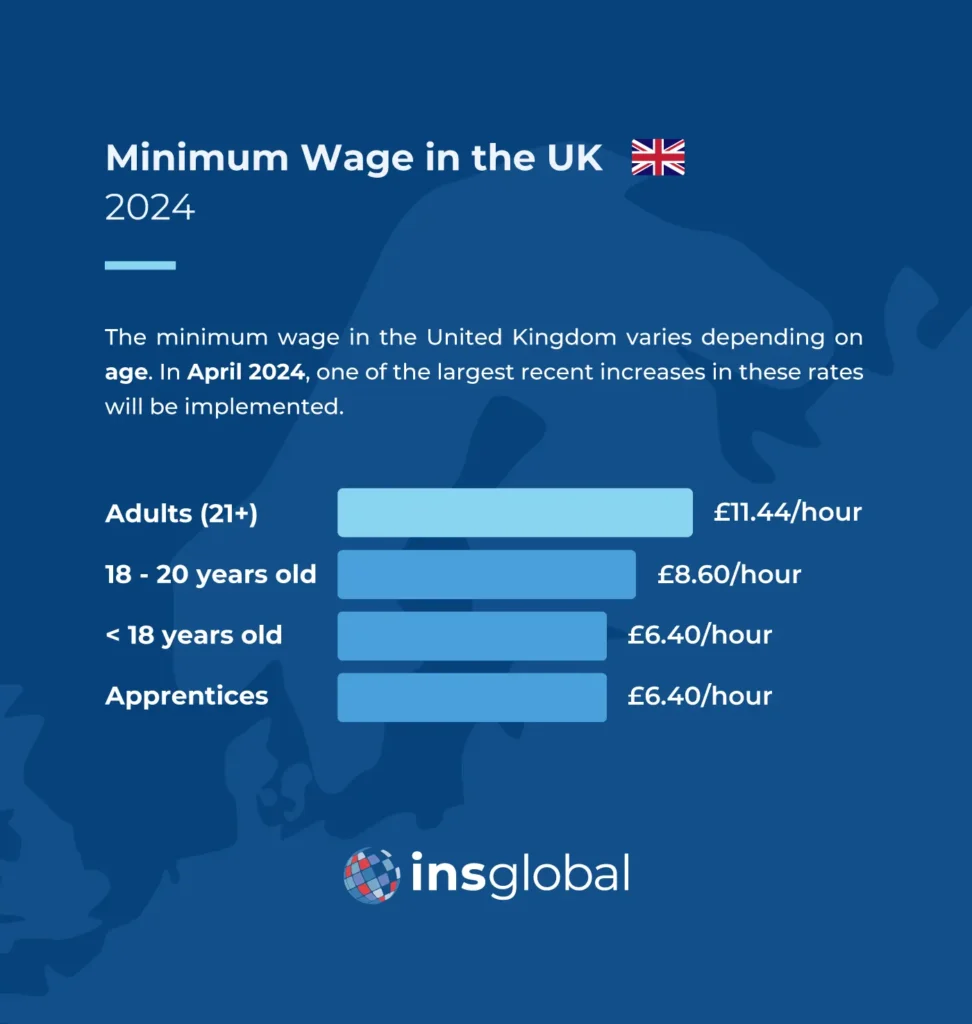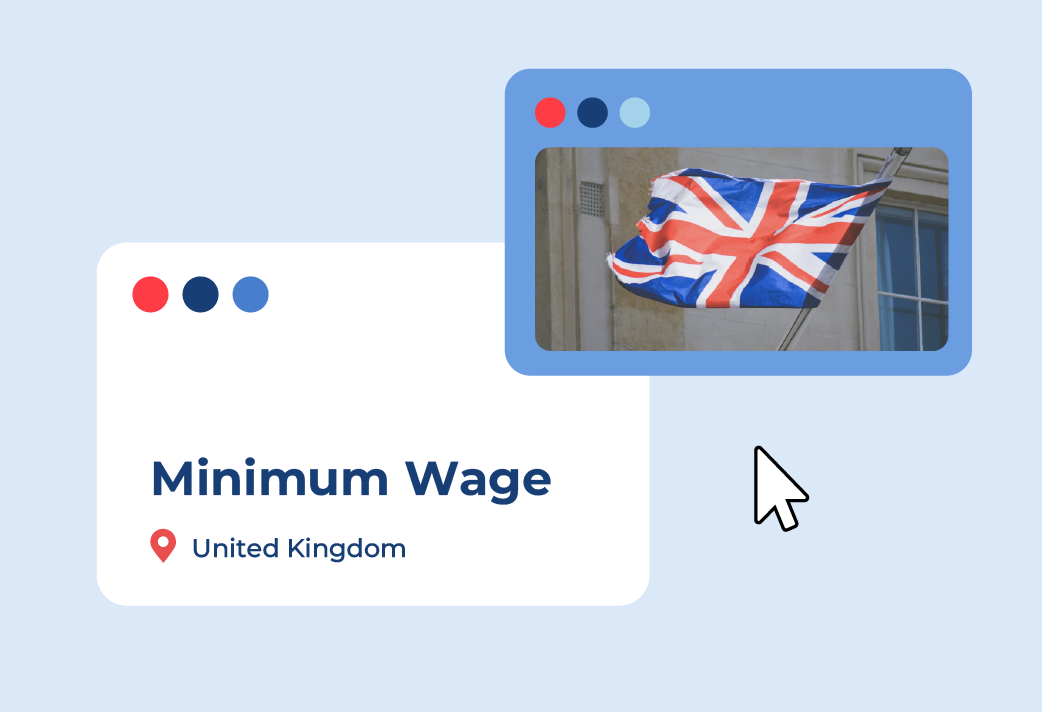Embarking on international expansion necessitates a profound understanding of salary standards in new markets. This rings particularly true for the United Kingdom, where comprehending the minimum wage in the UK is essential for effective workforce management, avoiding severe penalties, and ensuring employee satisfaction.

Tired of scrolling? Download a PDF version for easier offline reading and sharing with coworkers
How the Minimum Wage Works in the UK
In the United Kingdom, the minimum wage, known officially since 2016 as the National Living Wage, has been set at the national level since 1998, providing a standardized baseline across the country. The government determines the minimum wage as an hourly rate, considering factors such as the cost of living, economic conditions, and other relevant considerations.
Employees who are not being paid according to the UK minimum wage can complain to the HMRC (HM Revenue and Customs), which deals with employment, payroll, and taxes. Should the HMRC find a company guilty of underpaying its workers, it may be liable for back-paying all unpaid wages for the last 6 years, fines of up to £20,000 plus £100 per affected worker, future restrictions on trading ability, and potential criminal charges.
Wage theft is increasingly being seen as a problem in the UK, with billions of pounds being kept from workers, according to some studies. In 2023, there was a series of cases of companies failing or choosing not to pay their workers the legal minimum wage, with some companies being subject to significant fines as a result.
Penalties like this can seriously affect a company’s ability to operate in the UK going forward and damage its reputation in the eyes of partners and clients.
How the Minimum Wage in the UK is Determined Officially
Adjustments to minimum wage rates in the UK can occur annually or less frequently, reflecting economic conditions, inflation rates, and average salary levels.
The minimum wage in the UK last experienced adjustments to meet the evolving cost of living in April 2023.
What is the Minimum Wage in the UK in 2024?
The UK minimum wage is divided into different categories based on age, with separate rates for apprentices. For example, rates at the beginning of 2024 are:
- Standard adult rate (23 and over): £10.42 per hour
- 21-22 years old: £10.18 per hour
- 18-20 years old: £7.49 per hour
- Under 18 years old: £5.48 per hour
- Apprentices: £5.28 per hour

However, changes in 2024 will mark one of the biggest adjustments to the system surrounding the minimum wage in the UK in recent years.
In April 2024, rates will rise to the following:
- Standard adult rate (21+): £11.44 per hour
- 18-20 years old: £8.60 per hour
- Under 18 years old: £6.40 per hour
- Apprentices: £6.40 per hour
Potential Exceptions and Adjustments to the Minimum Wage in the UK
While the majority of workers are entitled to the minimum wage in the UK, specific situations may include exceptions or adjustments.
Job-Specific Exceptions
Self-employed individuals, company directors, and family members of an employer are among those who are not required to be paid according to the minimum wage.
Industry-Specific Adjustments
According to UK law, some industries may negotiate different minimum wage levels through collective bargaining agreements (CBAs). However, these agreements generally increase the amount required as part of a contract’s minimum standards, and wages affected by a CBA cannot fall below the national UK minimum wage.
Probation Period
During the probation period, workers may receive less than the agreed-upon wage as their contractual salary, but this amount must not fall below the national minimum wage.
The Minimum Wage in the UK and Special Work Hours
Overtime
There’s no legal requirement for overtime pay in the UK to be compensated at a premium rate. However, it’s typical for employers to offer workers 1.5 times the standard salary (commonly known as “time and a half”) for work hours exceeding their standard workweek.
Rest Days and Public Holidays
As statutory or public holidays (called bank holidays in the UK) do not have to be automatically given as paid leave in the UK, there is no mandatory premium rate of pay for workers who are asked to work on a holiday. However, workers in this situation are usually offered a higher rate of pay in addition to another day off in exchange.
Night Hours
There is no separate or higher minimum wage in the UK for work done at night.

Tools for Determining Minimum Salaries in the UK
Local Labor Authority Sites
The UK government announces all changes to the minimum wage via its website. This is the best way to get all official figures regarding any changes to the rules.
Ensuring Compliance in the UK with INS Global
The government considers and adjusts the minimum wage in the UK regularly as a key element of labor law. Furthermore, any practices which knowingly or unknowingly deprive a worker in the UK of their rights are taken extremely seriously. That’s why compliance assurance is so important for companies aiming to expand their operations in the UK.
INS Global offers compliance assurance support and global expansion services that help businesses navigate the challenges of international growth in the UK and 160 countries worldwide.
With expertise in HR operations and employment law compliance worldwide, INS Global gives you everything you need for a smooth entry into the UK market. Whether it’s recruiting, payroll, compliance, or HR streamlining services, our local Employer of Record (EOR) in the UK offers expertly crafted solutions to meet your specific business needs.
Contact our expert global expansion advisors today for more information on ensuring a seamless transition into the UK market.

SHARE